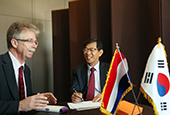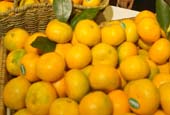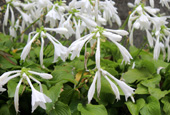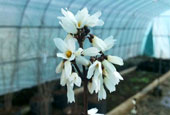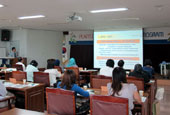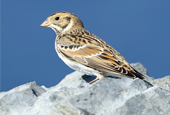A working-level meeting to seek ways to distinguish seed and plant varieties by using DNA profiling is now underway in Seoul.
The 14th Working Group on Biochemical and Molecular Techniques, and DNA-Profiling in Particular was organized by the Korea Seed and Variety Service, in cooperation with the International Union for the Protection of New Varieties of Plants (UPOV). The meeting is scheduled between November 9 and 14.
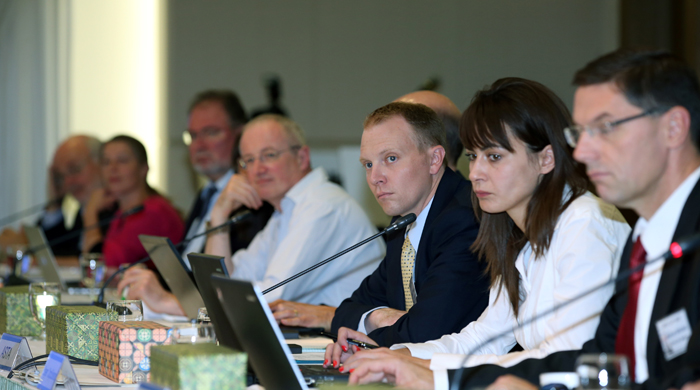
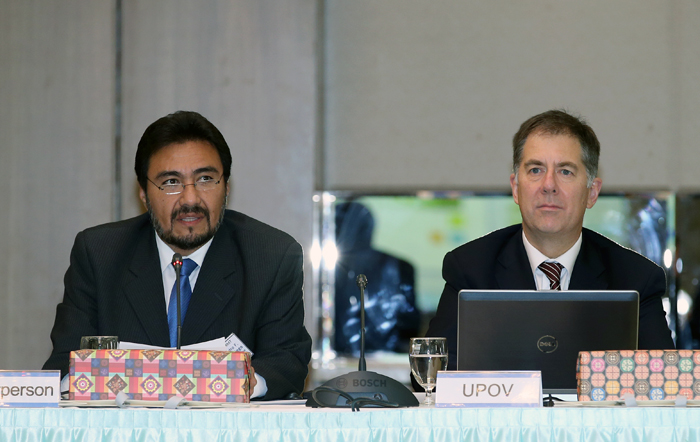
Biochemical and molecular biology professionals from 17 UPOV member nations will speak about the development of varieties-discerning molecular markers and outline cases of using molecular markers to fight rights violations. The discussions are designed to seek ways to strengthen the protection of breeders' rights and share biochemical and molecular techniques.
Molecular markers show differences in the DNA base sequences and allow researchers to directly examine genetic information and genetic relations between different breeds. Thus, they are widely used in discerning between different animal or plant varieties.
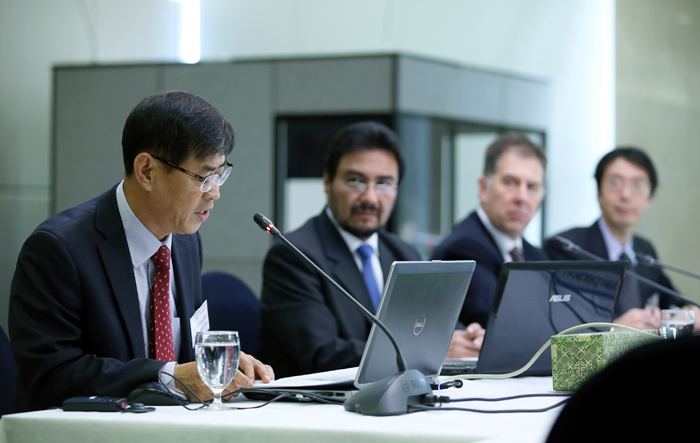
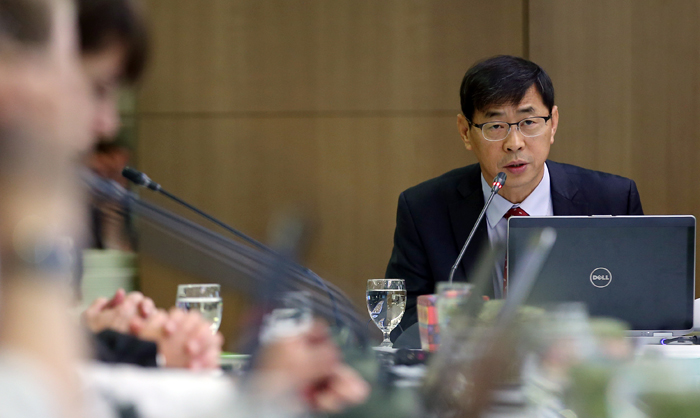
On the issue of the development and characteristics of molecular markers and their relationship to each other, some Korean scientists presented their research on fruit trees, lettuce and strawberries. China introduced its research results on roses, while Monsanto, an agrochemical and agricultural biotechnology company, presented its research results on corn. On the issues of developing biochemistry and molecular marker techniques and marking genetic limits, the U.K. presented its case study on potatoes while the International Seed Federation (ISF) introduced its study, also on corn.
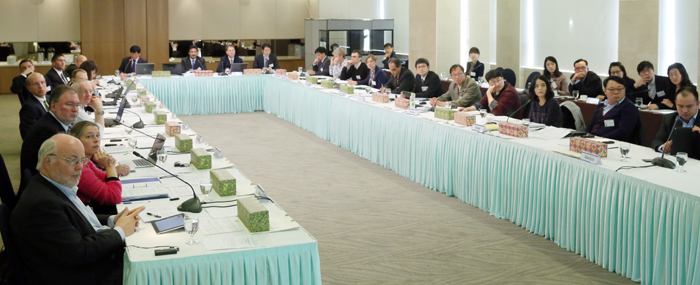
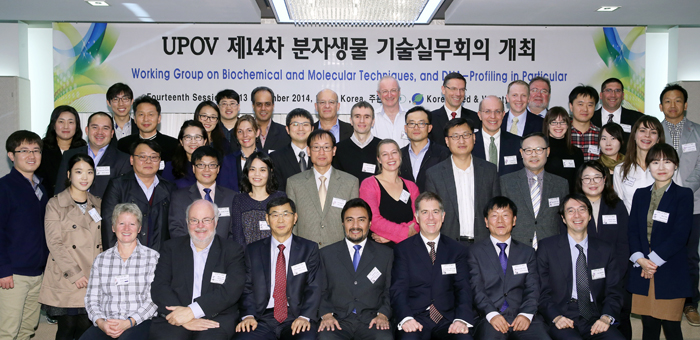
"The current meeting is expected to promote international cooperation on biochemistry and molecular techniques and boost discussions on the possibility of the commercial use of food and vegetables," said an official from the Korea Seed and Variety Service.
Below is an interview with Peter Button, vice secretary general of the International Union for the Protection of New Varieties of Plants.
By Wi Tack-whan, Limb Jae-un
Korea.net Staff Writers
Photos: Jeon Han
whan23@korea.kr

The 14th Working Group on Biochemical and Molecular Techniques, and DNA-Profiling in Particular was organized by the Korea Seed and Variety Service, in cooperation with the International Union for the Protection of New Varieties of Plants (UPOV). The meeting is scheduled between November 9 and 14.


The 14th Working Group on Biochemical and Molecular Techniques, and DNA-Profiling in Particular, part of the UPOV meeting, is underway in Seoul from November 9 to 14.
Biochemical and molecular biology professionals from 17 UPOV member nations will speak about the development of varieties-discerning molecular markers and outline cases of using molecular markers to fight rights violations. The discussions are designed to seek ways to strengthen the protection of breeders' rights and share biochemical and molecular techniques.
Molecular markers show differences in the DNA base sequences and allow researchers to directly examine genetic information and genetic relations between different breeds. Thus, they are widely used in discerning between different animal or plant varieties.


Shin Hyun-kwan, director general of the Korea Seed and Variety Service, gives the opening remarks at the meeting.
On the issue of the development and characteristics of molecular markers and their relationship to each other, some Korean scientists presented their research on fruit trees, lettuce and strawberries. China introduced its research results on roses, while Monsanto, an agrochemical and agricultural biotechnology company, presented its research results on corn. On the issues of developing biochemistry and molecular marker techniques and marking genetic limits, the U.K. presented its case study on potatoes while the International Seed Federation (ISF) introduced its study, also on corn.


Participants in the 14th UPOV Working Group on Biochemical and Molecular Techniques, and DNA-Profiling in Particular pose for a group photo.
"The current meeting is expected to promote international cooperation on biochemistry and molecular techniques and boost discussions on the possibility of the commercial use of food and vegetables," said an official from the Korea Seed and Variety Service.
Below is an interview with Peter Button, vice secretary general of the International Union for the Protection of New Varieties of Plants.
- The UPOV has been very active, but it is not well known among the public. What kind of an international organization is it?
- The International Union for the Protection of New Varieties of Plants creates conventions to establish an international system and to protect new plant breeds. We also encourage developers to create new breeds. We all rely on new varieties of plants and encourage and support the development of new breeds. We have made great efforts to improve productivity in farming. We need to produce high-quality foods and provide them at a price reasonable to consumers. Thus, we are making efforts to develop new varieties to meet human needs.
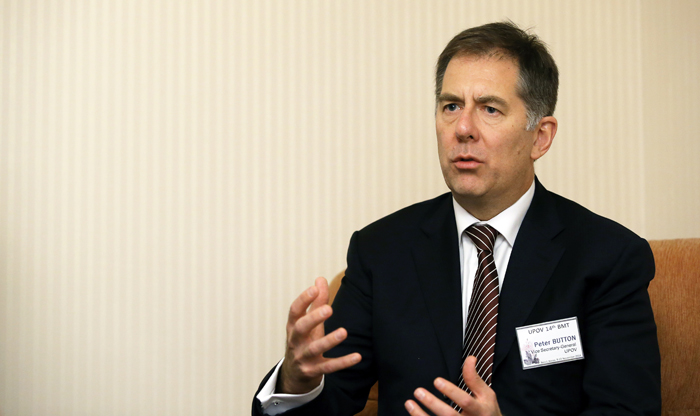
Peter Button is the vice secretary general of the International Union for the Protection of New Varieties of Plants.
- Eating and living has been a continuous problem ever since humans appeared on the earth. Humans have made an all out effort to provide sufficient food and to create an abundant life. This is closely related to the role played by the UPOV. In the 21st century, environmental changes, including climate change and global warming, have become very serious. Please tell us about your efforts to overcome such problems.
- Today, the farming industries face two different crises. One is the crisis caused by climate change. Every country knows about the climate change issue. Another problem is population growth. So we have to develop various sides of the agricultural industry with sufficient resources in each. Thus, the UPOV stresses more investment in developing new varieties of plants. We encourage people in all areas, such as individual farmers, agriculture-related companies and public institutions, to develop new plant breeds.
The Plant Variety Protection (PVP) system provides aid to everyone who develops a new breed. The UPOV compensates developers so that they can develop new breeds. In addition, it also helps other breed developers make use of these new varieties. We help developers use protected varieties and help them develop their own breeds.
- There is an old saying that, "Farmers are the strongest base of the world (Those who are engaged in farming are the biggest base of the world)." Is this a concept that coincides with the goals of the UPOV?
- The fundamental goal of the UPOV is to give benefits to farmers. Farmers are those who decide what kinds of breed they are going to cultivate. Their decision to select a breed and cultivate it arises from their conviction that they can benefit from it. That's why their choice is very important.
- The UPOV, then, in a word, is aiming for a "blue ocean." There are neither international conflicts of interest nor political confrontations facing it. The UPOV seems to continuously create value for everyone. Is this so?
This is reflected in the UPOV's mission statement. I absolutely agree with it. The mission statement contains a conviction in the public interest. The purpose of developing new varieties of plants is to return such benefits to society. I guess we could change a phrase in our mission statements to read, "blue ocean."
- Korea's share of the global seed market is very small. However, Korean authorities continue to make efforts to communicate with other nations concerning their research into seeds. What is the current situation and prospects for Korea's seed industry and seed research?
We have great confidence in Korea's seed market. In some cases, Koreans adopted other countries' models to further development. Korea is in a unique position within the UPOV. Korea only became the UPOV's 50th member in 2002, but since then it has shown strong support for the organization. Korea has hosted many technology conferences in relation to the UPOV and has established international guidelines for its major crops. In particular, it set up the international guidelines for special crops, such as ginseng.
Dr. Choi Keun-jin was the chairman of the UPOV general meetings for three years, from 2010 to 2012. The UPOV once selected five nations that have the strongest influence on the union, and one of them was Korea. Since Korea joined the union, the country has filed the sixth most applications for new varieties of plants. Korea's future is very bright in that sense.
- What kind of role do you expect Korea to play internationally?
- The country is heading in the right direction. Korea's protection of new varieties covers almost all plant species. Korea is expected to play a bigger role just by looking at that fact. I have always been impressed that Korea's technological level is very high and it has very good technologies. Korea is very advanced in electronic patent applications in the Plant Variety Protection (PVP) system and it is expected to play a key role in developing a similar system for the UPOV. Then, Korean breed developers will be able to file patent applications both in Korea and overseas.
By Wi Tack-whan, Limb Jae-un
Korea.net Staff Writers
Photos: Jeon Han
whan23@korea.kr

